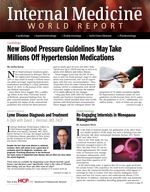Despite Risk for Criticism, Render Your Clinical Opinion
As internists, the best product we can offer to patients is our opinion derived from clinical experience and education.

Simon Douglas Murray, MD
Editor-in-Chief
As internists, the best product we can offer to patients is our opinion derived from clinical experience and education. After all, we perform no surgery, insert no tubes, operate no lasers, and conduct no procedures aside from the handful we learned as residents, which are probably better performed by medical technicians. What we are left with is sharing the benefit of our expertise.
In the final days of my residency, I crossed paths with an attending physician who introduced me to a patient in the lobby of the hospital. He told the patient that I was completing my residency program and would be starting my own practice, and since I would be practicing in the town where he lived, he went on to propose that perhaps the patient would like me to be his doctor. However, the initial sense of pride I felt quickly dissipated when the attending said, "Dr. Murray is our chief resident and I’ve known him for the past 4 years. I’ve learned that if you listen carefully to what he says and then don't do it, you'll be okay."
We all had a good laugh at my expense, but at the time, it did not dawn on me that patients make their own decisions regardless of what we tell them. But that does not mean it is a wasted effort to offer advice; rather, it is a piece of the information puzzle patients use to form their own opinions.
In the March 5, 2014, issue of JAMA, there is an interesting editorial piece entitled "What Would You Do, Doctor?" It is a question we have all heard before: "If this patient was your wife, what would you do?" The current consensus on this matter is that we should avoid answering it directly, because it is presumed that we do our best for all patients, regardless of whether or not they are our relatives.
The way I believe residents are taught to answer this question is to present a series of complex medical options to the patient or family from which to choose, like picking items off the menu at a Chinese restaurant. This avoids the risk of dictating to the patient what should be done, as well as evades the issue of being accused of making decisions for patients or unduly coercing them.
The current approach of dodging connection to patients on a personal level is becoming more common in modern medicine. By not rendering a definitive opinion, the doctor is distanced from the patient and insures that he will not have to live with the consequences of suggesting something that the patient or family will be unhappy with after-the-fact.
It is a much safer place to be, but for many patients, it is less than reassuring. It assumes that patients have the ability to understand foreign-sounding medical terms, obscure statistics, scary-sounding procedures, and drug therapies that they know almost nothing about.
We are entering a new era in medicine where time constraints and diminished personal satisfaction keep doctors from wanting to become personally involved in the lives of their patients, and instead prefer joining corporations and hospitals where they can work in shifts with set hours. In this system, responsibility is passed from one covering physician to another at the change of each shift. It is not uncommon for hospitalized patients to be cared for by several members of a hospitalist group, nurses who are assigned new patients each day, and a dizzying array of specialist groups who rotate their days in the hospital, all with no input from the attending physician.
The net result is no one takes any responsibility for what happens. Very often, nothing gets done until the hospital decides it is time to discharge the patient due to insurance regulations. When asked, the patients do not even know whom their doctor was.
Since there is a real risk of this happening, I feel strongly that attending physicians must remain involved with the care of their patients when they are admitted. I was trained to consider patient responsibility as a 24/7 obligation. We learned by example that we are never completely resolved of our responsibilities to patients, even if it means working after official office hours, missing a family party, or skipping a day off. Unfortunately, in modern medicine, these are no longer considered to be desirable traits of a good physician. Rather, it is said we will be better physicians by staying more balanced, having hobbies, and spending more time on vacation.
When we render our opinion to a patient confronted with a series of complex medical choices, we are at risk for criticism if the decision ultimately turns out to be unfavorable. But that is the price of being a doctor. By remaining aloof, we beg our responsibility to be truly engaged. Although seeming paternalistic is not a desirable modern trait, a certain amount of it is a great source of comfort to patients who are faced with difficult choices.
I am no longer so naïve as to believe rendering my opinion will automatically make a patient follow what I advise. As odd as it may seem, patients do not always perform what we tell them, though they will usually listen. I have learned there is truth in the old adage that patients want to know you care, rather than care about what you know.
Simon Douglas Murray, MD
Editor-in-Chief
Simon Douglas Murray, MD, is Clinical Assistant Professor of Medicine at Robert Wood Johnson Medical School in New Brunswick, NJ, and Senior Attending in the Department of Medicine at the University Medical Center at Princeton. He has been affiliated with the MDVIP physicians network since 2006 and currently practices internal medicine in Princeton, NJ.
